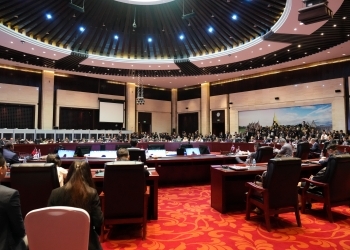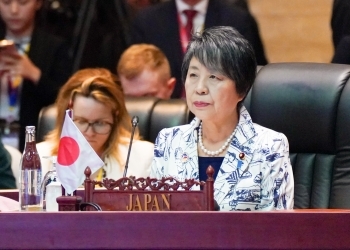Asia
The 14th East Asia Summit (EAS) Foreign Ministers’ Meeting


On July 27, commencing at 11 a.m. local time (1 p.m., JST) for about 135 minutes, the 14th East Asia Summit (EAS) Foreign Ministers’ Meeting was held in Vientiane, Lao PDR. Ms. KAMIKAWA Yoko, Minister for Foreign Affairs of Japan, attended the meeting. The overview of the meeting is as follows.
1 EAS Cooperation
Minister Kamikawa emphasized the importance of the EAS as the premier forum to discuss strategic issues in the region. Minister Kamikawa then expressed support for ASEAN centrality and unity as well as ASEAN Outlook on the Indo-Pacific (AOIP), and stated Japan had implemented cooperation in line with these. Minister Kamikawa also expressed that Japan will further promote cooperation based on principles of AOIP, such as openness, transparency and rules-based framework.
2 Regional and international issues
Minister Kamikawa stated it is important that all states agree on complying with basic principles of the UN Charter such as respect for sovereignty and territorial integrity, and striving for the world where a free and open international order based on the rule of law is maintained and strengthened, and human dignity is protected. Minister Kamikawa then pointed out that Japan opposes any unilateral attempts to change the status quo, whether in the seas surrounding Japan, such as the East China Sea, or anywhere else in the world, and also that fundamental human rights, freedoms and democracy in the region must be protected and promoted, and we oppose economic coercion. The overview of her remarks are as follows.
- In the South China Sea, militarization and coercive activities have been continuing. We have serious concerns about dangerous and escalatory actions at Second Thomas Shoal before, that have resulted in damage to Philippine vessels and injuries to Filipinos onboard. We take note of the dialogue between the Philippines and China and hope such efforts will lead to de-escalation. Unjust claims of maritime interests and activities that do not align with relevant provisions of UNCLOS are unacceptable. We reiterate the importance of efforts towards the peaceful settlement of disputes based on international law. Peace and stability across the Taiwan Strait is also important for the region and the international community.
Other participating counties expressed concerns over the situation in the South China Sea, mentioned the importance of the freedom of navigation and overflight, of the peaceful resolution of disputes in accordance with international law, and of the peace and stability across the Taiwan Strait, and expressed concerns over the increasing tensions. - Japan will maintain close communication with China at all levels in line with the broad direction of comprehensively promoting a “Mutually Beneficial Relationship Based on Common Strategic Interests” and building “constructive and stable Japan-China relations”.
- Japan is seriously concerned with North Korea’s nuclear and missile development, and its military cooperation with Russia. It is essential to fully implement the relevant UN Security Council Resolutions, to achieve North Korea’s complete, verifiable, and irreversible dismantlement (CVID) of all weapons of mass destruction and ballistic missiles of all ranges. We ask for the continued understanding and cooperation for the immediate resolution of the abductions issue.
Other participating countries spoke on concerns over North Korea’s provocative behaviors, and on the importance of the denuclearization of the Korean Peninsula and the full implementation of the relevant UNSCRs. - Japan is deeply concerned about the deteriorating situation in Myanmar. Japan will promote dialogue with various stakeholders and providing humanitarian assistance, and will continue to offer maximum support to ASEAN’s efforts including implementation of the “Five-Point Consensus.”
Other participating counties also expressed serious concerns over the situation in Myanmar and emphasized the importance of early implementation of “the Five-Point Consensus.” - Russia's aggression against Ukraine is a blatant breach of the UN Charter. Russia’s nuclear threats, including any potential use of nuclear weapons, are absolutely inadmissible. It is crucial for Russia to withdraw all of its military forces from Ukraine, and we need to achieve a just and lasting peace as quickly as possible.
Other participating countries expressed serious concerns over the situation in Ukraine, condemned Russia’s aggression against Ukraine. - The situation in Gaza is at a critical juncture toward the conclusion of negotiations. We will work together as a whole international society to improve the humanitarian situation and to restore calm as soon as possible.
Other participating countries made remarks on the situation in the Middle East, including immediate ceasefire and humanitarian aid. - The discharge of ALPS treated water into the sea has been safely carried out in accordance with international standards. Through independent monitoring by the IAEA from a scientific standpoint, it has been confirmed that the discharge of ALPS treated water is in accordance with relevant international safety standards. We will keep working closely together with the IAEA and will continuously provide explanation based on scientific evidence in a highly transparent manner.
3 Closing Remarks
In the end, Minister Kamikawa stated that Japan supports ASEAN’s efforts to foster dialogue and cooperation in the region and will continue to further enhance cooperation under the EAS.

